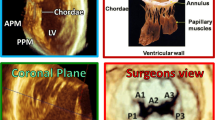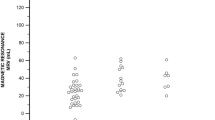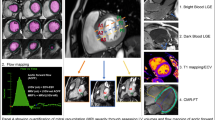Abstract
The mitral valve surgery decision is made mainly according to echocardiographic (ECHO) criteria. As the asymptomatic patients are still candidates for surgery in some situations, this makes the accurate assessment of mitral regurgitation (MR) severity and cardiac dimensions even more important. We aimed to compare ECHO and cardiac magnetic resonance imaging (CMR) in the assessment of MR severity and cardiac dimensions. In this prospective study, we included all patients with more than mild MR by ECHO and referred to our university hospital from 1st of April 2017 and 1st of April 2019. Exclusion criteria were critically ill patients, presence of other valve lesions, planned revascularization, pregnancy and contraindication for CMR. All patients had full history taking, examination, body surface area, and ECG. MR severity and left atrial and left ventricular dimensions were assessed in 50 patients with both 2D-ECHO and CMR in the same day. There were no significant differences in baseline clinical characteristics between moderate (24 patients) and severe MR (26 patients) groups. Poor degree of agreement was present between CMR and ECHO assessment for MR severity (same degree of MR only in 36% (18/50 patients) with kappa grade = 0.19). Furthermore, ECHO overestimated grades of MR compared to CMR (severe MR in 52% vs. 38.4%, p = 0.01 respectively). Based on the etiology of MR, primary (30 patients) vs. secondary MR (20 patients) showed the same dis-agreement between CMR and ECHO assessment of MR severity. Left atrial and ventricular dimensions showed good agreement between CMR and ECHO. Our results suggest that CMR could be more accurate than ECHO in assessing the severity of MR especially in severe cases that need surgery.


Similar content being viewed by others
References
Nishimura RA, Otto CM, Bonow RO, Carabello BA, Erwin JP 3rd, Guyton RA, O'Gara PT, Ruiz CE, Skubas NJ, Sorajja P, Sundt TM 3rd, Thomas JD, College A, of Cardiology, American Heart Association Task Force on Practice G. (2014) aha/acc guideline for the management of patients with valvular heart disease: Executive summary: a report of the american college of cardiology/american heart association task force on practice guidelines. J Am Coll Cardiol 2014(63):2438–2488
Detaint D, Messika-Zeitoun D, Maalouf J, Tribouilloy C, Mahoney DW, Tajik AJ, Enriquez-Sarano M (2008) Quantitative echocardiographic determinants of clinical outcome in asymptomatic patients with aortic regurgitation: a prospective study. JACC Cardiovasc Imaging 1:1–11
Cawley PJ, Maki JH, Otto CM (2009) Cardiovascular magnetic resonance imaging for valvular heart disease: technique and validation. Circulation 119:468–478
Thavendiranathan P, Phelan D, Collier P, Thomas JD, Flamm SD, Marwick TH (2012) Quantitative assessment of mitral regurgitation: how best to do it. JACC Cardiovasc Imaging 5:1161–1175
Myerson SG (2012) Heart valve disease: investigation by cardiovascular magnetic resonance. J Cardiovasc Magn Reson 14:7
Harris AW, Krieger EV, Kim M, Cawley PJ, Owens DS, Hamilton-Craig C, Maki J, Otto CM (2017) Cardiac magnetic resonance imaging versus transthoracic echocardiography for prediction of outcomes in chronic aortic or mitral regurgitation. Am J Cardiol 119:1074–1081
Uretsky S, Supariwala A, Nidadovolu P, Khokhar SS, Comeau C, Shubayev O, Campanile F, Wolff SD (2010) Quantification of left ventricular remodeling in response to isolated aortic or mitral regurgitation. J Cardiovasc Magn Reson 12:32
Uretsky S, Gillam L, Lang R, Chaudhry FA, Argulian E, Supariwala A, Gurram S, Jain K, Subero M, Jang JJ, Cohen R, Wolff SD (2015) Discordance between echocardiography and mri in the assessment of mitral regurgitation severity: a prospective multicenter trial. J Am Coll Cardiol 65:1078–1088
Penicka M, Vecera J, Mirica DC, Kotrc M, Kockova R, Van Camp G (2018) Prognostic implications of magnetic resonance-derived quantification in asymptomatic patients with organic mitral regurgitation: comparison with doppler echocardiography-derived integrative approach. Circulation 137:1349–1360
Cawley PJ, Hamilton-Craig C, Owens DS, Krieger EV, Strugnell WE, Mitsumori L, D'Jang CL, Schwaegler RG, Nguyen KQ, Nguyen B, Maki JH, Otto CM (2013) Prospective comparison of valve regurgitation quantitation by cardiac magnetic resonance imaging and transthoracic echocardiography. Circ Cardiovasc Imaging 6:48–57
Lang RM, Badano LP, Mor-Avi V, Afilalo J, Armstrong A, Ernande L, Flachskampf FA, Foster E, Goldstein SA, Kuznetsova T, Lancellotti P, Muraru D, Picard MH, Rietzschel ER, Rudski L, Spencer KT, Tsang W, Voigt JU (2015) Recommendations for cardiac chamber quantification by echocardiography in adults: an update from the american society of echocardiography and the european association of cardiovascular imaging. Eur Heart J Cardiovasc Imaging 16:233–270
Zoghbi WA, Enriquez-Sarano M, Foster E, Grayburn PA, Kraft CD, Levine RA, Nihoyannopoulos P, Otto CM, Quinones MA, Rakowski H, Stewart WJ, Waggoner A, Weissman NJ, American Society of E (2003) Recommendations for evaluation of the severity of native valvular regurgitation with two-dimensional and doppler echocardiography. J Am Soc Echocardiogr 16:777–802
Zoghbi WA, Adams D, Bonow RO, Enriquez-Sarano M, Foster E, Grayburn PA, Hahn RT, Han Y, Hung J, Lang RM, Little SH, Shah DJ, Shernan S, Thavendiranathan P, Thomas JD, Weissman NJ (2017) Recommendations for noninvasive evaluation of native valvular regurgitation: a report from the american society of echocardiography developed in collaboration with the society for cardiovascular magnetic resonance. J Am Soc Echocardiogr 30:303–371
Pu M, Vandervoort PM, Griffin BP, Leung DY, Stewart WJ, Cosgrove DM III, Thomas JD (1995) Quantification of mitral regurgitation by the proximal convergence method using transesophageal echocardiography: Clinical validation of a geometric correction for proximal flow constraint. Circulation 92:2169–2177
Gardner BI, Bingham SE, Allen MR, Blatter DD, Anderson JL (2009) Cardiac magnetic resonance versus transthoracic echocardiography for the assessment of cardiac volumes and regional function after myocardial infarction: an intrasubject comparison using simultaneous intrasubject recordings. Cardiovasc Ultrasound 7:38–38
Lopez-Mattei JC, Ibrahim H, Shaikh KA, Little SH, Shah DJ, Maragiannis D, Zoghbi WA (2016) Comparative assessment of mitral regurgitation severity by transthoracic echocardiography and cardiac magnetic resonance using an integrative and quantitative approach. Am J Cardiol 117:264–270
Uretsky S, Argulian E, Narula J, Wolff SD (2018) Use of cardiac magnetic resonance imaging in assessing mitral regurgitation: current evidence. J Am Coll Cardiol 71:547–563
Liu B, Edwards NC, Pennell D, Steeds RP (2019) The evolving role of cardiac magnetic resonance in primary mitral regurgitation: ready for prime time? Eur Heart J Cardiovasc Imaging 20:123–130
Gelfand EV, Hughes S, Hauser TH, Yeon SB, Goepfert L, Kissinger KV, Rofsky NM, Manning WJ (2006) Severity of mitral and aortic regurgitation as assessed by cardiovascular magnetic resonance: optimizing correlation with doppler echocardiography. J Cardiovasc Magn Reson 8:503–507
Sachdev V, Hannoush H, Sidenko S, Saba SG, Sears-Rogan P, Bandettini WP, Brofferio A, Shanbhag SM, Brenneman CL, Horvath KA, Waclawiw MA, Arai AE (2017) Are echocardiography and cmr really discordant in mitral regurgitation? JACC Cardiovascular Imaging 10:823–824
Fujita N, Chazouilleres AF, Hartiala JJ, O'Sullivan M, Heidenreich P, Kaplan JD, Sakuma H, Foster E, Caputo GR, Higgins CB (1994) Quantification of mitral regurgitation by velocity-encoded cine nuclear magnetic resonance imaging. J Am Coll Cardiol 23:951–958
Shanks M, Siebelink HM, Delgado V, van de Veire NR, Ng AC, Sieders A, Schuijf JD, Lamb HJ, Ajmone Marsan N, Westenberg JJ, Kroft LJ, de Roos A, Bax JJ (2010) Quantitative assessment of mitral regurgitation: comparison between three-dimensional transesophageal echocardiography and magnetic resonance imaging. Circ Cardiovasc Imaging 3:694–700
Grayburn PA, Carabello B, Hung J, Gillam LD, Liang D, Mack MJ, McCarthy PM, Miller DC, Trento A, Siegel RJ (2014) Defining "severe" secondary mitral regurgitation: emphasizing an integrated approach. J Am Coll Cardiol 64:2792–2801
Uretsky S, Argulian E, Supariwala A, Marcoff L, Koulogiannis K, Aldaia L, Chaudhry FA, Wolff SD, Gillam LD (2018) A comparative assessment of echocardiographic parameters for determining primary mitral regurgitation severity using magnetic resonance imaging as a reference standard. J Am Soc Echocardiogr 31(9):992–999
Bertelsen L, Svendsen JH, Køber L, Haugan K, Højberg S, Thomsen C, Vejlstrup N (2016) Flow measurement at the aortic root - impact of location of through-plane phase contrast velocity mapping. J Cardiovasc Magn Reson 18:55
Van De Heyning CM, Magne J, Cosyns B (2019) Is cardiac magnetic resonance imaging the new “gold standard” for quantitation of mitral regurgitation? a critical appraisal. J Am Soc Echocardiogr 32:163
Funding
The authors received no specific funding for this work.
Author information
Authors and Affiliations
Corresponding author
Ethics declarations
Conflict of interest
All authors declare that they have no competing interest.
Additional information
Publisher's Note
Springer Nature remains neutral with regard to jurisdictional claims in published maps and institutional affiliations.
All authors listed takes responsibility for all aspects of the reliability and freedom from bias of the data presented and their discussed interpretation.
Rights and permissions
About this article
Cite this article
Hassan, A.K.M., Algowhary, M.I., kishk, A.Y.T. et al. Cardiac magnetic resonance assessment of mitral regurgitation severity appears better than echocardiographic imaging. Int J Cardiovasc Imaging 36, 889–897 (2020). https://doi.org/10.1007/s10554-020-01772-1
Received:
Accepted:
Published:
Issue Date:
DOI: https://doi.org/10.1007/s10554-020-01772-1




